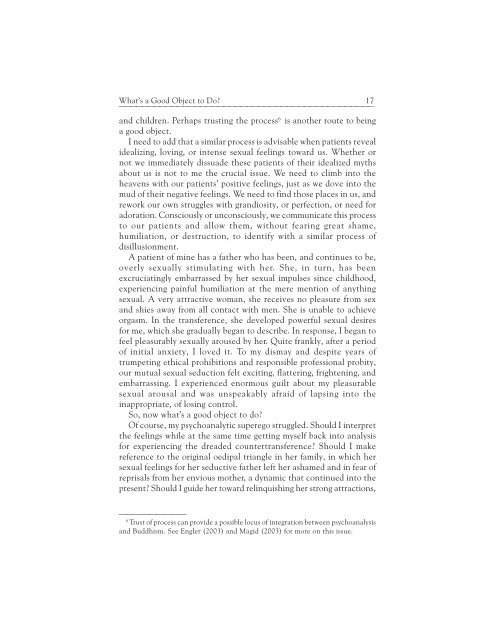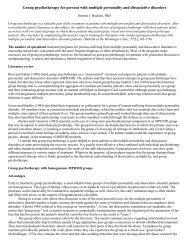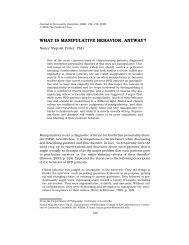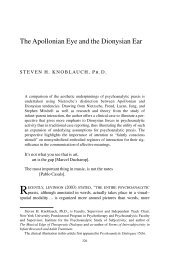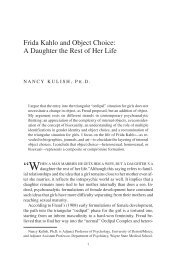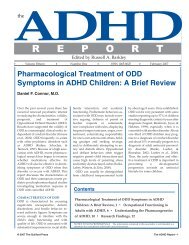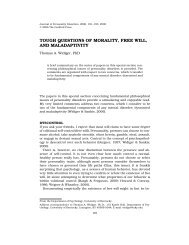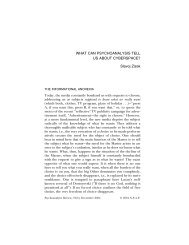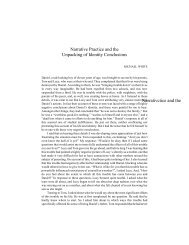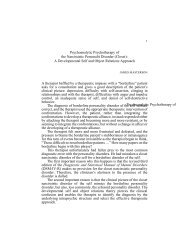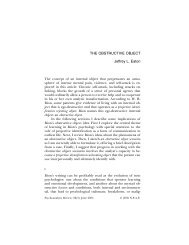What's a Good Object to Do? - PsyBC
What's a Good Object to Do? - PsyBC
What's a Good Object to Do? - PsyBC
Create successful ePaper yourself
Turn your PDF publications into a flip-book with our unique Google optimized e-Paper software.
What’s a <strong>Good</strong> <strong>Object</strong> <strong>to</strong> <strong>Do</strong> 17<br />
⎯⎯⎯⎯⎯⎯⎯⎯⎯⎯⎯⎯⎯⎯⎯⎯⎯⎯⎯⎯⎯⎯⎯⎯⎯⎯⎯⎯⎯⎯⎯⎯⎯⎯⎯⎯⎯⎯⎯⎯⎯⎯⎯⎯<br />
and children. Perhaps trusting the process 6 is another route <strong>to</strong> being<br />
a good object.<br />
I need <strong>to</strong> add that a similar process is advisable when patients reveal<br />
idealizing, loving, or intense sexual feelings <strong>to</strong>ward us. Whether or<br />
not we immediately dissuade these patients of their idealized myths<br />
about us is not <strong>to</strong> me the crucial issue. We need <strong>to</strong> climb in<strong>to</strong> the<br />
heavens with our patients’ positive feelings, just as we dove in<strong>to</strong> the<br />
mud of their negative feelings. We need <strong>to</strong> find those places in us, and<br />
rework our own struggles with grandiosity, or perfection, or need for<br />
adoration. Consciously or unconsciously, we communicate this process<br />
<strong>to</strong> our patients and allow them, without fearing great shame,<br />
humiliation, or destruction, <strong>to</strong> identify with a similar process of<br />
disillusionment.<br />
A patient of mine has a father who has been, and continues <strong>to</strong> be,<br />
overly sexually stimulating with her. She, in turn, has been<br />
excruciatingly embarrassed by her sexual impulses since childhood,<br />
experiencing painful humiliation at the mere mention of anything<br />
sexual. A very attractive woman, she receives no pleasure from sex<br />
and shies away from all contact with men. She is unable <strong>to</strong> achieve<br />
orgasm. In the transference, she developed powerful sexual desires<br />
for me, which she gradually began <strong>to</strong> describe. In response, I began <strong>to</strong><br />
feel pleasurably sexually aroused by her. Quite frankly, after a period<br />
of initial anxiety, I loved it. To my dismay and despite years of<br />
trumpeting ethical prohibitions and responsible professional probity,<br />
our mutual sexual seduction felt exciting, flattering, frightening, and<br />
embarrassing. I experienced enormous guilt about my pleasurable<br />
sexual arousal and was unspeakably afraid of lapsing in<strong>to</strong> the<br />
inappropriate, of losing control.<br />
So, now what’s a good object <strong>to</strong> do<br />
Of course, my psychoanalytic superego struggled. Should I interpret<br />
the feelings while at the same time getting myself back in<strong>to</strong> analysis<br />
for experiencing the dreaded countertransference Should I make<br />
reference <strong>to</strong> the original oedipal triangle in her family, in which her<br />
sexual feelings for her seductive father left her ashamed and in fear of<br />
reprisals from her envious mother, a dynamic that continued in<strong>to</strong> the<br />
present Should I guide her <strong>to</strong>ward relinquishing her strong attractions,<br />
⎯⎯⎯⎯⎯⎯⎯⎯⎯<br />
6<br />
Trust of process can provide a possible locus of integration between psychoanalysis<br />
and Buddhism. See Engler (2003) and Magid (2003) for more on this issue.


